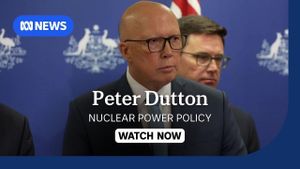The nomination of Robert F. Kennedy Jr. to lead the Department of Health and Human Services (HHS) has raised significant concerns among doctors and public health experts. Alarm bells are ringing over Kennedy’s long history of anti-vaccine advocacy, with many fearing his leadership could endanger public health initiatives aimed at increasing vaccine uptake, which has already seen a decline during the pandemic due to misinformation. Key medical groups like the American Medical Association (AMA) and the American Academy of Pediatrics (AAP) have surprisingly stayed silent on his nomination, even after his controversial confirmation hearings last week.
Many physicians are frustrated by this lack of action from major health organizations. These groups possess substantial influence on healthcare policy and their silence on Kennedy’s nomination could shape the opinions of pivotal Republican senators who are weighing their support for him. The Senate Finance Committee is scheduled to vote on Kennedy’s nomination, and the medical community is urging these organizations to take a stand.
“I think the AMA should stand up and say with a clear voice what we all know to be true: this guy is uniquely unqualified. This guy is scary,” said Dr. Rob Davidson, who noted the importance of these groups to advocate for science-driven policies. Davidson, who leads the Committee to Protect Health Care, announced his organization mobilized more than 18,000 physicians to sign letters opposing Kennedy’s nomination.
While Kennedy has said he will not implement policies as HHS Secretary discouraging vaccinations, many remain skeptical. Critics worry he could worsen vaccine confidence and mismanage future public health crises, potentially hampering vaccine development efforts. Kennedy is the founder of the anti-vaccine group Children’s Health Defense, and has publicly spread numerous falsehoods about vaccines and their safety.
During the Senate hearings, Kennedy stated he supports vaccines for diseases like measles and polio, but previous statements where he claimed no vaccine was completely safe raised eyebrows. He faced pointed questions from senators, including Sen. Ron Wyden (D-Ore.), who pressed him on past comments he made, where he stated he wished he could have not vaccinated his children. “Are you lying to Congress today when you say you are pro-vaccine, or were you lying on those podcasts?” Wyden asked, exposing the inconsistencies in Kennedy’s statements.
Sen. Bill Cassidy, a Republican from Louisiana who is also a physician, expressed concern over Kennedy’s past views and their potential ramifications for vaccine confidence among parents. Cassidy recounted treating patients who suffered from vaccine-preventable diseases and emphasized the dangers of undermining trust in vaccinations.
The Senate Finance Committee’s concerns extend beyond just Kennedy’s commentary on vaccines. Senators Elizabeth Warren (D-Mass.) and Ron Wyden have raised alarm about Kennedy's financial interests originating from lawsuits about the HPV vaccine Gardasil, which could present ethical conflicts should he be confirmed. Kennedy disclosed he has been entitled to referral fees from cases connected to Gardasil, aggravations expressed to him by senators during hearings. “By using your authority and bully pulpit as Secretary to sway the outcome of the litigation, you would increase the chances of a large payout for yourself,” warned Wyden.
Despite the widespread apprehension stemming from his past actions and statements, some analysts predict Kennedy will be confirmed, as they believe his attempts to distance himself from his anti-vaccine rhetoric may appease some lawmakers' concerns. Kennedy’s history and his pivot toward accepting the importance of vaccinations reflect the complex dynamics at play within the Senate, as factions grapple with both public health perspectives and political affiliations.
Beyond the immediate concerns raised by Kennedy’s confirmation hearing, the fallout is already affecting professional organizations. The silence of the AMA and the AAP has caused discontent among their members. Dr. Irwin Redlener, who is both part of the AAP and a professor at Albert Einstein College of Medicine, criticized the organizations for not vocally opposing Kennedy’s nomination, stating, “I think it is really quite irresponsible of them not to weigh in on this candidate. Vaccinations are foundational for pediatricians.”
Not all organizations have chosen to remain quiet. The American Public Health Association (APHA), representing approximately 25,000 public health professionals, publicly opposed Kennedy’s nomination, cautioning against his disregard for scientific consensus. “We felt the need to weigh in early and often, particularly due to his opposition to good science,” explained Executive Director Georges Benjamin.
While Kennedy’s nomination continues to garner attention, the medical community's collective silence raises questions about their commitment to defending public health. Many expect the Senate Finance Committee's vote on Tuesday to be telling, as both Kennedy’s past and the hesitance of other senators to fully endorse him weigh heavily on the proceedings. The outcome not only impacts Kennedy's future but sets a precedent on how health policy leaders are selected and the importance of scientific integrity within the Department of Health and Human Services. Whatever the decision, the conversation surrounding vaccinations, public trust, and health policy has been reignited, ensuring the stakes remain high.



